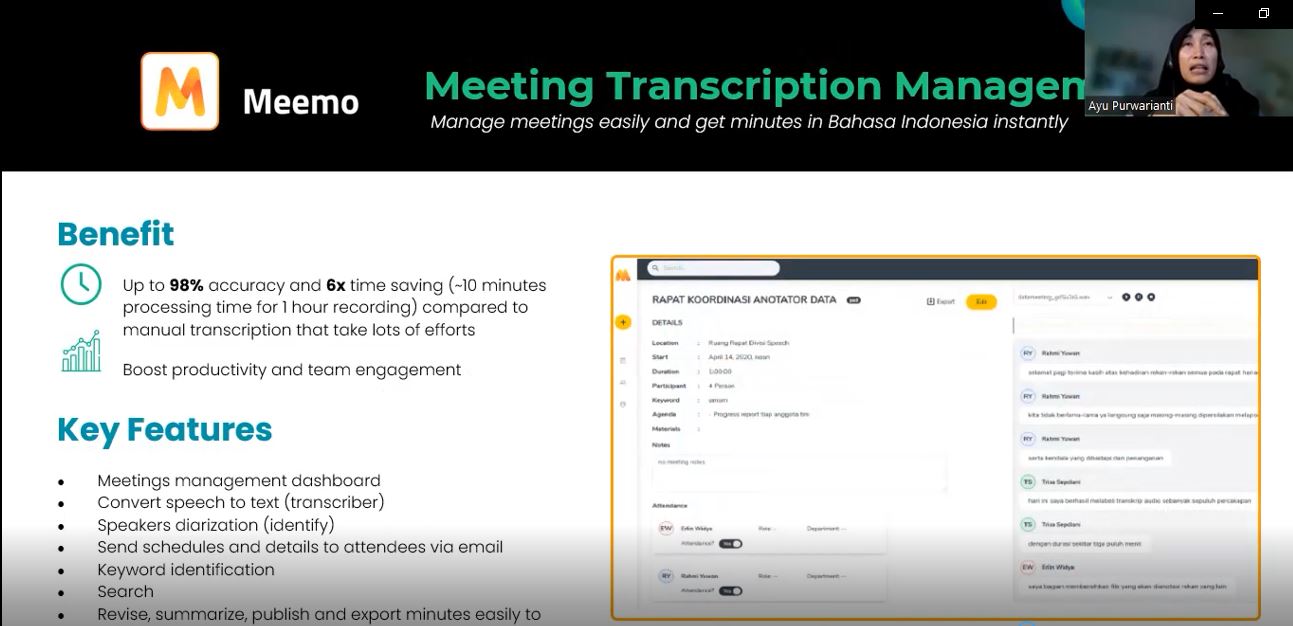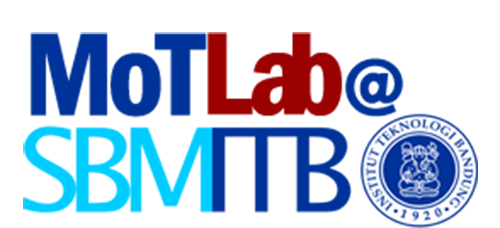
BANDUNG, mot.sbm.itb.ac.id – Management of Technology Laboratory School of Business and Management, Institut Teknologi Bandung (MoT Lab SBM-ITB) in collaboration with the SBM-ITB Master of Science Management Study Program and Doctor of Science in Management (MSM-DSM) held a Knowledge Cafe on Tuesday (13/12/22) at the Kresna Lobby SBM-ITB . This event was held to disseminate the research results of the SBM-ITB academic community to the broader community. At the December 2022 edition of the Knowledge Cafe, the topic was “Business Agility During the Pandemic Era” presented by research grant awardees from Facebook (Meta), namely Dr.rer.pol. Eko Agus Prasetio, Dedy Sushandoyo, PhD., and Dr. Eng. Ayu Purwarianti.
The competitive research was one of five (5) winners out of 189 proposals from 39 countries for proposals funded by Facebook (Meta). The ITB researcher raised this research topic by tracing how agile business actors were during the COVID-19 pandemic. This research is motivated by the domino effect caused by the COVID-19 pandemic, which has forced many small and medium businesses to operate online. This research is divided into three approaches: qualitative, quantitative, and technical.

Knowledge Cafe event moderated by Dita Novizayanti, MSM. of the research team, opened by Plt. Deputy Dean for Academic Affairs, namely Prof. Tjandra Anggraini. In his remarks, Prof. Tjandra appreciated this event and was very impressed with the achievements of the research grant awardees from Facebook. He especially hoped that this dissemination event could motivate the participants who attended to be encouraged to apply for a similar research grant. “Hopefully, the sharing provided by the resource persons can motivate all of us to try for research project proposals by looking at the trick,” hoped Prof. Tjandra.
Presentation of Three Research Approaches
After the remarks, the event continued with presentations from each research team coordinator. First, Dr.rer.pol. Agus Prasetio, MBA, gave a presentation on the quantitative research approach. In his presentation, he pointed out that implementing operational agility in a business is proven to increase customer value results only when digitalization is implemented. This relationship can be strengthened by increasing engagement with local tourism communities (POKDARWIS). Implementing customer agility improves customer value outcomes only when a high degree of digitization is implemented. This relationship can be strengthened by increasing engagement with the POKDARWIS.
From these findings, it is suggested that homestay business actors collaborate with POKDARWIS in each region. Specifically, in the case of areas with low potential for digitization implementation, procedures to maximize operational agility are required. Meanwhile, in the case of areas with high potential for digitalization, techniques are needed to strengthen customer operations and agility.

Second, Dedy Sushandoyo, PhD. for a qualitative approach. In his presentation, he explained that this research investigates how big data and organizational processes affect a company’s business agility. The business agility referred to in this research is a company’s ability to improve product performance and create new businesses. This research takes case studies at four startup companies as case studies, namely eFishery, Credibook, Kazee and Prosa.ai, and a survey of homestay owners and managers in Indonesia in the 2019-2021 period with 350 respondents.
The findings from this research indicate that startups with a middle to lower target market need more data from non-application instruments than application data. Big data generally affect organizational processes (Organizational Process), and these administrative processes affect business agility (Business Agility). In addition, the involvement of top management was also found to affect business agility, specifically how companies can create new business.

This study’s results suggest that company management can determine a big data strategy by considering the functions and characteristics of the application and non-application data. This determination can be based on the company’s need to create a new business or improve product quality. In addition, it is expected that top management can manage their organizational processes in determining business agility in an era full of changes.
Third, Dr. Eng. Ayu Purwarianti for a technical approach using artificial intelligence technology for media monitoring. This research retrieves data from online news from Kumparan, Kompas, CNBC Indonesia, CNN Indonesia, Detik, and Republika in 2020-2022. The data collection uses relevant predefined keywords but has several limitations because it is still in the preliminary stage. Then the data will be further analyzed using AI technology to obtain information on sentiment concepts, suggestions, etc.

From the media monitoring, 1,540 data was obtained with 17,017 concepts (3,776 positive concepts, 6,498 neutral concepts, and 6,743 negative concepts) which provide the following insights. First, the discussion regarding businesses/UMKM/homestays that are losing money/bankrupt/out of business/affected by Covid is slowly decreasing. When viewed from a comparison of negative and positive sentiment, in 2022, it will start to decline, namely around 1.5: 1. Unlike the previous two years, the proportion of negative sentiment was 2 times more than positive sentiment. Second, the concept that appears most frequently is `UMKM.` This shows that the MSME sector was the news that existed during 2020-2022 related to the impact of covid/pandemic/etc, which caused the most losses/bankruptcy. Then, let’s look at sentiment distribution on the MSME concept. It shows that negative sentiment dominates other emotions, even neutral views.
Encouragement of Research Dissemination to the Public
After the explanation from the research team’s coordinator, the event continued with a question and answer session. Participants enthusiastically asked research questions to the speakers. This Knowledge Cafe event will likely increase the number of civitas researchers utilizing international research funds in the future. In addition, it is necessary for academics to regularly disseminate research to the public so that the intellectual benefits of developing knowledge can educate the nation’s life.


In particular, the Director of the MoT Lab, in his closing remarks, revealed that through this event, the researchers received input to further elaborate on the research that is currently being carried out. He also said that during the event, the speakers enjoyed the discussion process because this event was festive. “From this event, we get important things that will be elaborated in more detail for our research. We also enjoyed the discussion during this event“, said Dr.rer.pol. Eko Agus Prasetio.
This inaugural Knowledge Cafe was held in collaboration between community members and research assistants from the SBM-ITB MoT Lab, MSM-DSM Study Program, SBM-ITB Markom, SBM-ITB Sarpras, and sponsors, namely Facebook (Meta) and Golden Bridge Specialty Coffee.
Reported by: Uruqul Nadhif Dzakiy

